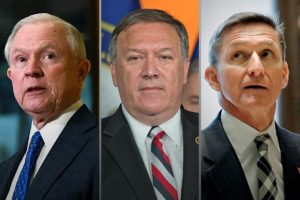by WorldTribune Staff, November 18, 2016
The Trump revolution has crossed the Potomac.
President-elect Donald Trump has begun to fill key law enforcement and national security positions as his team deployed “landing parties” to Washington, D.C. to expedite the transition process.
Trump announced on Nov. 17 that he plans to nominate Sen. Jeff Sessions, Alabama Republican, as attorney general and Rep. Mike Pompeo, Kansas Republican, as CIA director. The president-elect also confirmed he has selected retired Lt. Gen. Michael Flynn as his national security adviser, a position that, unlike the other two, does not need to be confirmed by the Senate.

“The president-elect is a man of action, and we’ve got a great number of men and women with great qualifications who look forward to serving in this administration,” Vice President-elect Mike Pence told reporters in New York.
“Our agency teams arrived in Washington D.C. this morning, and I am very confident it will be a smooth transition that will serve to lead this country forward.”
Democrats will not be able to filibuster Trump’s nominations to executive branch positions. Under Sen. Harry Reid’s direction, they eliminated that option in 2013 for all nominations except Supreme Court justices.
Trump’s team said the landing parties would be deployed in three waves: national security, economic and domestic.
The national security wave met with Obama administration officials, who “gave them thick binders and detailed presentations that included organization charts, budget forecasts and parking space assignments, said veterans of previous transitions,” the Washington Post reported on Nov. 17.
“The next wave is the economic landing team,” Trump spokesman Sean Spicer told reporters in a conference call.
The economic team will arrive at the Treasury, Commerce Department, U.S. Trade Representative’s office, Small Business Administration and Social Security Administration.
The final team will go to domestic agencies, including the departments of Interior, Agriculture, Homeland Security, Energy, Labor, Transportation, Education, and Health and Human Services, as well as independent agencies such as the Office of Management and Budget, Federal Trade Commission and NASA.
“At that point, we might start getting indication of whether this is a friendly or hostile takeover or handover. It goes in both directions,” said Douglas Brook, who worked on outgoing transition teams of President George H.W. Bush and President George W. Bush.
He said both sides typically are professionals who “speak the same language” in their fields of expertise, regardless of policy differences.
“Both sides need to be aware that the clock is running and there is a lot of work to be done so that when the inauguration takes place there is a minimum amount of hiccups,” said Brook, a visiting professor at the Sanford School of Public Policy at Duke University.
Despite repeated reports by the major media about slow progress and turmoil in the Trump transition, the president-elect is on pace with most recent presidents in filling his Cabinet. When Barack Obama was putting together his first administration in 2008, he did not make his first Cabinet appointment until three weeks after the election.
“Lots of reasons to be concerned about @realDonaldTrump transition but the pace of the announcements isn’t one of them. That’s not a fair shot,” former Obama senior adviser David Axelrod tweeted.
“We hadn’t made any major appointments at this point in 2008. I don’t remember being criticized for it,” he wrote.
